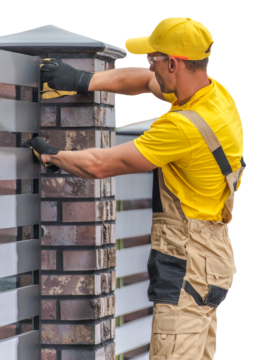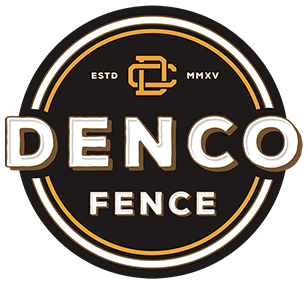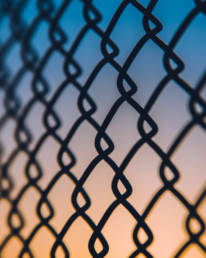Installing a fence on your property adds curb appeal, privacy, protection, and a host of additional benefits. But with so many fencing materials now available, selecting the best can seem a bit overwhelming to the average homeowner. While the best fencing option varies from one household to the next -based on their needs, budget, and other factors -its longevity weighs heavily on the list of important factors to take into consideration.
Some fence materials last only four or five years before they need tremendous repairs or replacement. Others last 15 or 20 years while some fencing materials last 50 years or more. When longevity matters, pick from one of the fencing materials on this list. These three materials will not disappoint your needs for a great fence that’s around for many generations to come.
Wrought Iron Fencing
So you want a fence that lasts, do you? Look no further than wrought iron, the longest-lasting, strongest, most durable of all the fencing materials available. With an average 50- to 100-year lifespan, wrought iron fences outlast even the harvest weather elements or physical impacts without a scratch.
Elegant and sophisticated, wrought iron brings a dramatic touch of appeal to the home and its exterior. This increases the curb appeal of the home, in turn making for very happy neighbors.
Expect added value once a wrought iron fence has been installed. Should you decide to sell the home in the future, the wrought iron fencing maximizes profits!
Choose another fencing material aside from wrought iron if privacy is something you want. Designed for appeal and style, wrought iron fencing often lacks the components necessary for privacy. While the fence will keep out undesirables, it will not stop prying eyes from seeing inside the home.
If the upfront cost for the wrought-iron fence is within your budget and privacy isn’t a big concern, give this fencing material a look.
Vinyl Fencing
The most preferred fencing material on the market, vinyl siding is second to wrought iron in terms of durability and longevity. With a 20 to 30-year lifetime, vinyl fencing delivers an amazing bargain thanks to its low upfront costs.
Choose from many attractive designs and styles, including a wood-like grain.
Homeowners prefer vinyl fences over other fencing materials. It is affordable, comes in a host of designs and colors, requires no maintenance, is termite and mold resistant, and has tons of other features.
Vinyl fencing is:
- Fire-resistant
- Mold-resistant
- Weather-resistant
- Maintenance-free
- Removes dirt, dead bugs, and other grime from a fence with an annual power wash. It is a quick, easy, and affordable way to keep vinyl fencing at its best.
Chain Link Fencing
Chain link fencing is often thought to be a commercial product but in reality, homeowners often choose the material since it is affordable, weatherproof, and provides superior protection against uninvited guests on your property.
The lack of style is the biggest turn-off with this fence. It is not as attractive as other fence materials. Although chain link fences come in black and traditional colors, that’s about it for options.
Chain link fences require some maintenance, the level varying depending on the weather and other factors. We all know the weather in Denver is just as uncertain about its plans as we all are! There’s also some worry of damage due to rain, sleet, and snow since the chain link fence is susceptible to rust damage.
Expect an average life span of about 20-years with a chain-link fence installed on your property.
Other Factors That Impact Longevity
Although the fence material greatly impacts longevity, other factors also affect the life of your fence, the most common reasons being:
- Inadequate/improper installation
- High winds in Denver, averaging 9.9 miles per hour in January, add pressure to the fence, which can result in leaning if the fence is not properly anchored to the ground. Wind in Denver sometimes gets bad. In fact, a petition to call Denver the “Windy City” instead of Chicago once made its way around the internet.
- Freestanding water can compromise the foundation underneath the fence
How to Extend the Life of Your Fence
Maximize the life of your new fence with the following tips in mind before, during, and after installation.
- Clean leaves and debris away from the fence. Debris creates a warm environment in which unwanted pests thrive. Pests can damage fencing.
- Keep trees and shrubs away from the fence line. Immediately remove any trees/shrubs you see growing near the root structures.
- Choosing one of the fencing materials on the list above reduces the risk of damage, but in the event, something happens, call Denco for repairs at the first sign of trouble. Delaying repairs only worsens the problem, in turn increasing repair costs.
- Keep an eye on your fencing. If you notice anything unusual or see damages, call a repairman at once. A few inspections each year will greatly reduce the need for replacement.
Need expert fence installers? Give Denco a call at 303-223-6902. Request a FREE, no-obligation estimate, talk to one of our trained fence installers, or schedule a consultation.

Need an expert opinion? Talk to our experts today!
When you talk to our experts at Denco Fence Company, we’ll help you compare fence styles, share design ideas, and answer any questions along the way. If you’re looking to build or repair a fence that you and your neighbors are going to love, get a free estimate and let us help bring your project to life.

